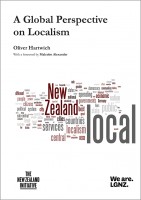Can representative democracy survive?
Can representative democracy survive in the 21st century? According to Leon de Winter, the Dutch novelist and intellectual, the chances are not too good. Read more

Oliver is the Executive Director of The New Zealand Initiative. Before joining the Initiative, he was a Research Fellow at the Centre for Independent Studies in Sydney, the Chief Economist at Policy Exchange in London, and an advisor in the UK House of Lords. Oliver holds a Master’s degree in Economics and Business administration and a PhD in Law from Bochum University in Germany.
Oliver is available to comment on all of the Initiative’s research areas.
Phone: +64 4 499 0790
Can representative democracy survive in the 21st century? According to Leon de Winter, the Dutch novelist and intellectual, the chances are not too good. Read more
On Monday Europe’s statistical agency, Eurostat, published its official annual data for the European Union’s public finances. Superficially, there is at least some good news in the figures: the eurozone deficit for 2012 was 3.7 per cent of GDP. Read more
The European crisis plays itself out on different levels: some clearly visible, others less so. What dominated the headlines of the past four years was Europe’s sovereign debt crisis. Read more
When think tanks launch their reports, reactions are typically divided. Fair enough: our goal is to present innovative analysis and recommendations and trigger debates. Read more
A chameleon might blush with envy next to British Prime Minister David Cameron. Eight years after his election as leader of the Conservative Party, and a little more than three years since becoming Prime Minister in a coalition government with the Liberal Democrats, Cameron has reinvented himself yet again. Read more
It is good to see housing high on the policy agenda. That is where it should be. Read more
For those who had hoped we might slowly leave the Great Recession behind, this week brought bad news on both sides of the Atlantic. In the US, the government shutdown after Republicans and Democrats failed to reach an agreement on the budget. Read more

A joint publication from The New Zealand Initiative and Local Government New Zealand (LGNZ). A Global Perspective on Localism discusses the question of if the developed world is looking to put more power in the hands of people at a local government level, why is New Zealand headed in the other direction? Read more
Following Germany’s federal election last Sunday, most international commentators concluded that Chancellor Angela Merkel has reached the zenith of her power. Her party won 41.5 per cent of the vote and missed a parliamentary majority by only five seats in a Bundestag of 630 MPs. Read more
Less than a week after David Cunliffe's ascension to the Labour leadership, the details of his policies remain unsurprisingly sparse. However, there is no doubt where the inclinations lie on tax policy. Read more
A grey outlook on Europe’s pension reform | Dr Oliver Hartwich | Business Spectator The crisis of its monetary union may be Europe’s most pressing economic problem for the coming years, but it is not the continent’s greatest challenge in the long run. Europe’s demographic change is an even more serious issue. Read more
If Australia’s new government needed a reminder of what economic challenges lie ahead, the recent Global Competitiveness Report 2013-2014 delivered it. For the first time since the World Economic Forum started gathering data on the economic attractiveness of different countries, Australia dropped out of the global top 20 and is now in 21st place. Read more
Most followers of the euro crisis agree that the German elections, to be held on September 22, will be a watershed moment. Everything that had been put on hold in the crisis will finally be allowed to happen once Angela Merkel has been returned to power. Read more
Imagine the following situation: Your next-door neighbours are going to have a party. They know it will be noisy and it might last till the wee hours. Read more